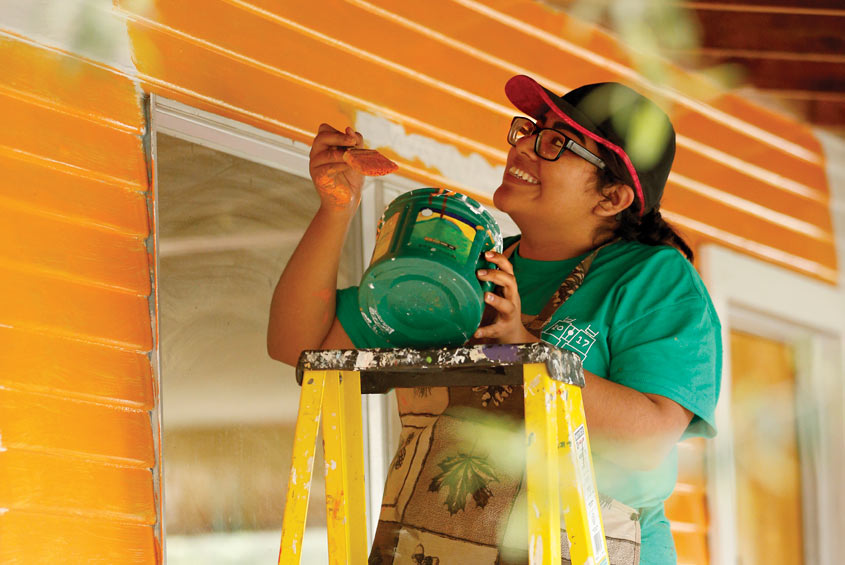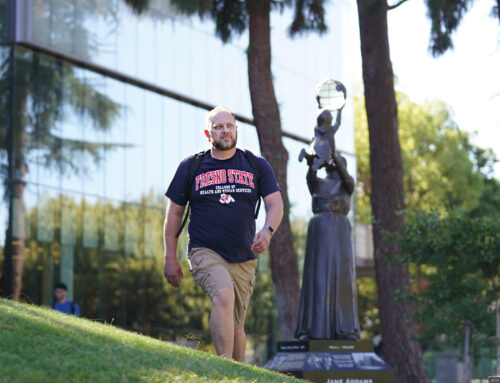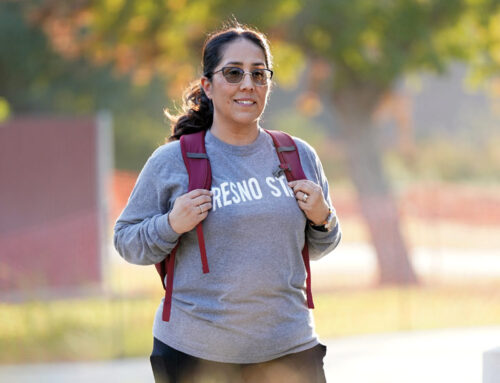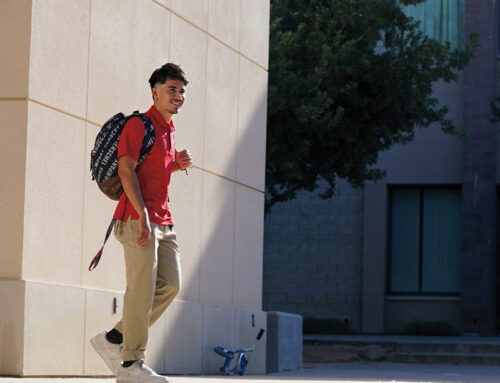Learning by Serving
Research links service-learning to higher graduation rates
by Lisa Maria Boyles
Fresno State has cemented itself as a service-oriented university with students, faculty and staff providing more than 10 million hours of service to the community over the past 10 years. The concept of volunteerism has become part of the campus culture — and it’s not going unnoticed nationally.
Service, along with social mobility and research, was among the three pillars factored in when Fresno State ranked No. 17 on Washington Monthly’s list of the top national universities in August.
Now, a new study conducted by two Fresno State researchers — Hongtao Yue and Steven Hart — is further demonstrating the impact of service-learning on campus. The research found students who took at least one service-learning course were 25 percent more likely to graduate than those who did not take any service-learning courses.
Service-learning courses enhance students’ civic understanding through participation in meaningful service linked to academic study or coursework, says Chris Fiorentino, the director of the University’s Jan and Bud Richter Center for Community Engagement and Service-Learning.
“What they have found, using statistical analysis, is really the most powerful testament to one pedagogical approach having an impact on graduation rates,” Fiorentino says. “Even when you control for things like a student’s GPA, the number of units they’ve taken at the time they take a service-learning class, their socio-economic status — even when you control for those variables, service-learning is shown to be extremely influential in positively impacting students’ graduation rates.”
Yue, a research analyst in Fresno State’s Office of Institutional Effectiveness,
has worked in the field for 10 years. Hart is an associate professor in the Department of Literacy, Early, Bilingual and Special Education. He is coordinator of the urban civic education program, and he teaches courses on literacy foundations, literacy assessment and service-learning pedagogy.
Their study, published in the spring 2017 issue of the Michigan Journal of Community Service Learning, analyzed 31,074 undergraduate students who enrolled at Fresno State from fall 2002 to fall 2009.
In addition to the finding that one service-learning course increased
students’ likelihood of graduating, their research also found that taking additional service-learning courses increased the likelihood of graduation. Also, participation in service-learning coursework at the upper-division level had larger correlations with graduation than it did in lower-division courses.
Regarding the findings for upper-division courses, Yue and Hart said it makes sense because upper-division courses are more aligned with students’ majors, which increased motivation
and enhanced relevance.
“The results of this study suggest that service-learning is a high-impact practice that increased the likelihood of student graduation,” Yue says. “The University should have strong commitment to service-learning programs, including increased offerings of upper-division service-learning courses, increased training of faculty in service-learning and developing initiatives that promote student participation in service-learning courses across their academic experiences.”
Dr. Matthew Ari Jendian, chair of the Department of Sociology and director of the Humanics program at Fresno State, has incorporated service-learning into his courses for 20 years.
“The findings of this study resonate with my experience, and the positive impact of service-learning extends beyond retention and graduation,” Jendian says. “There are positive impacts on students’ self-efficacy and sense of their own ability to act and make a difference, long-term positive impacts on the civic engagement of alumni and positive impacts on faculty.”
Music composition and theory professor Dr. Benjamin Boone started teaching at Fresno State in 2000, but didn’t discover what service-learning really meant until he attended a workshop on the subject five years later.
“I was shocked to learn that what I had thought was service-learning was in fact community engagement, or volunteering,” Boone says. “What distinguishes service-learning from volunteering and other types of service is that it is intimately tied to the curriculum of a particular course. A high-quality service-learning project not only provides meaningful service, but it enhances academic learning, and it consciously teaches civic learning.”
Fresno State students have engaged in various service-learning projects in recent years, including working with youth at Stone Soup Fresno, helping to revitalize the El Dorado Park neighborhood near campus and opting to serve others as part of the Alternative Spring Break program.
During the 2016-17 academic year alone, 14,565 Fresno State volunteers contributed more than 1.3 million hours of service, valued at more than $40 million in time.
“Students find the hands-on experiences invaluable,” says Kim Morin, a professor in the Department of Theatre Arts who incorporates service-learning into her classes on children’s theatre and puppetry. “Most of my students are graduating seniors, and many comment that they want to incorporate the lessons they have learned from their service-learning experiences directly into their future careers as teachers. Students comment about service-learning helping them become better collaborators and making them more aware of the world around them. Many say that they plan to continue to volunteer in the community in some way.”
Betsy A. Hays, a media, communications and journalism professor, was named the University’s Faculty Service-Learning Scholar for 2017-18.
“Service-learning makes everything better,” Hays says. “The students care more, work harder, find personal and professional meaning, and we all get to make the world a better place to some degree. By making assignments ‘real,’ the standard is elevated — both from a faculty and student perspective.”
— Lisa Maria Boyles is a communications specialist for the College of Arts and Humanities at Fresno State.






